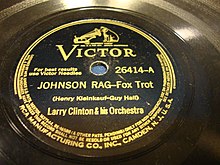Larry Clinton

Larry Clinton (born August 17, 1909 in Brooklyn , New York City , † May 2, 1985 in Tucson , Arizona ) was an American trumpeter , trombonist , arranger and band leader in the field of swing and popular music .
Life
Larry Clinton was self-taught ; In addition to his main instrument, the trumpet, he also played the trombone and clarinet. In his twenties he worked as a trumpeter with Isham Jones , as an arranger for the swing orchestras of Claude Hopkins 1933, Tommy and Jimmy Dorsey 1935/36, Glen Gray's Casa Loma Orchestra 1936/37 and 1937 for Louis Armstrong and Bunny Berigan ; Clinton's composition Dipsy Doodle became a hit for Tommy Dorsey's band in 1938.
From 1937 to 1941 Larry Clinton led his own popular band for the first time; it resulted in a number of hits for Victor Records . The band's repertoire ranged from current pop melodies (like I Double Dare You, Summer Souvenirs or Over the Rainbow ), instrumental numbers like A Study in Brown written by Clinton , and swing adaptations of classical compositions, with lyrics to pieces by Claude Debussy and Pyotr Tchaikovsky (Our Love).
His version of Debussy's Reverie, with band singer Bea Wain , was particularly popular. Under the title My Reverie , its version reached number 1 on the Billboard charts in 1938 . The last of his number 1 hits was Deep Purple penned by Peter DeRose in February 1939.
Clinton's band was primarily a studio group recording for Victor, Jubilee, and Bluebird Records , but also performed occasionally in colleges and hotel lobbies. In Larry Clinton's band played a. a. Charlie Mariano , Nat Pierce , Babe Russin and Joe Mooney . In 1941, Clinton appeared with his band in six short music films, the popular movie jukebox films; the films were eventually released as Soundies in 1943. This was one of his last occupations as a band leader; during the Second World War he worked as a flight instructor. He resumed his musical activities after the war, and from 1948 to 1950 he had a smaller ensemble.
In 1956, Clinton recorded his greatest hits again with a studio big band for RCA, with Helen Ward taking over the vocal numbers from Bea Wain. ( Larry Clinton in Hi-Fi , RCA, LPM-1342 ) Here he got the opportunity for the first time to record his composition "Study In Brown" himself. Clinton stayed in the music industry until 1961, working as A&R for Kapp Records and a music publisher. He died in Tucson in 1985 at the age of 75.
A collection of Clinton's arrangements and other material has been added to the collection of the University of Wyoming's American Heritage Center at Laramie .
literature
- Leonard Feather , Ira Gitler : The Biographical Encyclopedia of Jazz. Oxford University Press, New York 1999, ISBN 0-19-532000-X .
- George T. Simon : The Golden Era of Big Bands. Hannibal, Höfen 2004, ISBN 3-85445-243-8 .
- Leo Walker: The Big Band Almanac. Ward Ritchie Press, Pasadena 1978.
Web links
- Christopher Popa: Larry Clinton: "True Confession". In: Big Band Library. August 2004-
| personal data | |
|---|---|
| SURNAME | Clinton, Larry |
| BRIEF DESCRIPTION | American trumpeter, trombonist, arranger and band leader in the field of swing and popular music |
| DATE OF BIRTH | 17th August 1909 |
| PLACE OF BIRTH | Brooklyn , New York City |
| DATE OF DEATH | May 2, 1985 |
| Place of death | Tucson , Arizona |
